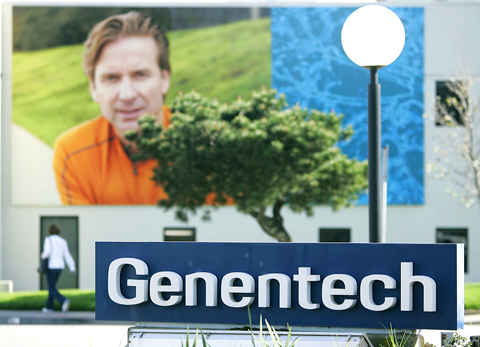Swiss drug developer Roche boosted its hostile tender offer for biotechnology pioneer Genentech Inc to US$93 per share on Friday, raising the total offer value to US$45.7 billion, after its initial offer failed to pick up much support from shareholders.
For weeks, Genentech’s board had been calling Roche’s US$86.50 bid too low, with much of Wall Street saying shareholders likely wouldn’t bite at the offer.
In its statement on Friday, Roche said it received tenders for only 500,000 shares in the tender offer that was set to expire on Thursday, a tiny fraction of the 44 percent the company needs to take control of Genentech.

As of Feb. 6, Genentech has just more than 1.05 billion shares of common stock outstanding, of which Roche owned about 587.2 million.
It needs the support from a majority of the other shareholders to complete any deal.
The US$86.50 bid had been a surprise to many, following rejection of an US$89-per-share bid by Genentech’s board in July. The tender offer has been extended from Thursday to March 20.
In a Securities and Exchange Commission filing late on Friday, the company said it had raised about US$36 billion through a series of debt offerings. It expects to get the rest of the funding through a combination of debt financing, which could include private placements of notes, commercial paper and borrowings, or with available cash, the company said.
The latest statement from Roche didn’t say how the increased offer might affect its ability to raise additional funding.
“Based on conversations with Genentech shareholders, we believe that there is a strong sentiment to bring this process to a conclusion,” Roche Group chairman Franz Humer said in the statement. “As a result, we are increasing our price to US$93 per share to maximize shareholder participation and will proceed quickly to complete all necessary financing.”
Genentech advised its shareholders to take no action on the revised bid. A special committee of the board will make a formal statement soon, the company said.
On Monday, Genentech spent a four-hour meeting with analysts, detailing long-term sales and research projections to back up its assertion that the company was worth more than the Roche offer. In previous regulatory filings, Genentech said it could be worth up to US$112 per share.

Quanta Computer Inc (廣達) chairman Barry Lam (林百里) is expected to share his views about the artificial intelligence (AI) industry’s prospects during his speech at the company’s 37th anniversary ceremony, as AI servers have become a new growth engine for the equipment manufacturing service provider. Lam’s speech is much anticipated, as Quanta has risen as one of the world’s major AI server suppliers. The company reported a 30 percent year-on-year growth in consolidated revenue to NT$1.41 trillion (US$43.35 billion) last year, thanks to fast-growing demand for servers, especially those with AI capabilities. The company told investors in November last year that

Intel Corp has named Tasha Chuang (莊蓓瑜) to lead Intel Taiwan in a bid to reinforce relations between the company and its Taiwanese partners. The appointment of Chuang as general manager for Intel Taiwan takes effect on Thursday, the firm said in a statement yesterday. Chuang is to lead her team in Taiwan to pursue product development and sales growth in an effort to reinforce the company’s ties with its partners and clients, Intel said. Chuang was previously in charge of managing Intel’s ties with leading Taiwanese PC brand Asustek Computer Inc (華碩), which included helping Asustek strengthen its global businesses, the company

Taiwanese suppliers to Taiwan Semiconductor Manufacturing Co. (TSMC, 台積電) are expected to follow the contract chipmaker’s step to invest in the US, but their relocation may be seven to eight years away, Minister of Economic Affairs J.W. Kuo (郭智輝) said yesterday. When asked by opposition Chinese Nationalist Party (KMT) Legislator Niu Hsu-ting (牛煦庭) in the legislature about growing concerns that TSMC’s huge investments in the US will prompt its suppliers to follow suit, Kuo said based on the chipmaker’s current limited production volume, it is unlikely to lead its supply chain to go there for now. “Unless TSMC completes its planned six

Power supply and electronic components maker Delta Electronics Inc (台達電) yesterday said it plans to ship its new 1 megawatt charging systems for electric trucks and buses in the first half of next year at the earliest. The new charging piles, which deliver up to 1 megawatt of charging power, are designed for heavy-duty electric vehicles, and support a maximum current of 1,500 amperes and output of 1,250 volts, Delta said in a news release. “If everything goes smoothly, we could begin shipping those new charging systems as early as in the first half of next year,” a company official said. The new